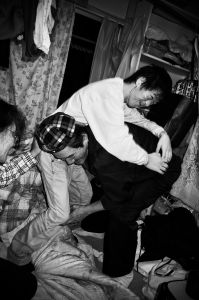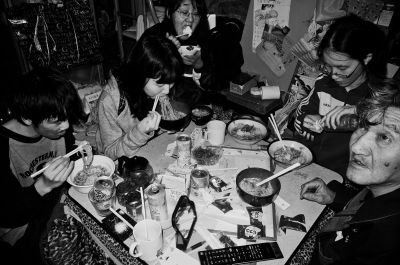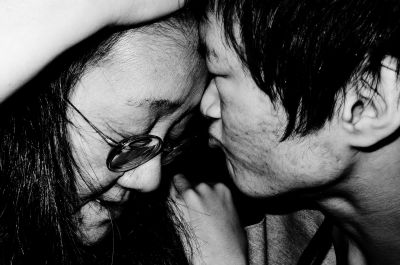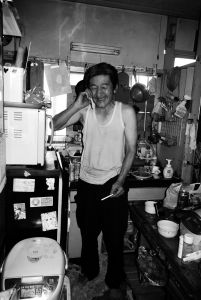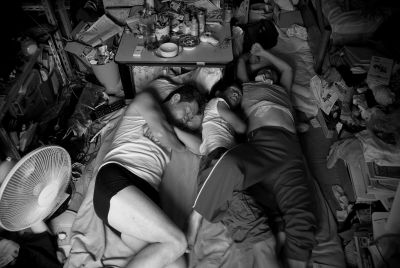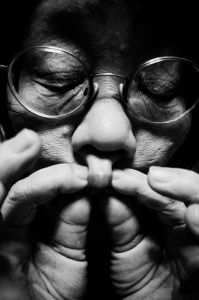Capturing the Ecology: An Interview with Masaki Yamamoto
Interview by Julian Lucas
Japanese photographer Masaki Yamamoto presents a body of work that is consistently honest and powerfully confident. Masaki captures family life without any limits. The photographer and his family co-existed for 18 years in a tiny 1 room apartment. Guts is visually appealing and warmhearted, offering us a contrasted view of what we consider to be within the family album.
Did you begin the project simply for documentary purposes or did you have a specific plan behind it?
In the past, I did take pictures of my family before for our family album, but for this project, I decided to seriously document my family again, since I have graduated from photography school. It was after I started this project that I began to think about what family and happiness means to me.
What was the reaction of your family while documenting the interactions? What was the dialogue?
There are times when they do not react at all, but there are also many times when we would laugh together. For pictures such as my mother licking the rice cakes stuck on her fingers and my father putting baby powder all over his body, my family and I would laugh at them and say how disgusting and dirty they look. When I show them all these photographs I have taken, they would tell me things like "what's the point in taking so many pictures?", "what is so good about this picture?" or "why would people like pictures of such a messy home?", but they are all very supportive. Depending on the situation, sometimes they reject from being photographed, but I always observe how they react and won't do it if they don't like it. My sister asked me to treat her to expensive sushi though, since some of her private pictures are being published.
Did you keep a diary of the conversations? If so, would you like to share an excerpt?
I don't have a diary of the conversations, but there an unforgettable episode I'd like to mention. My elder brother (who is 2 years older) and I hadn't spoken to each other for 10 years before this project. He has been living separately from our family and sometimes he visits our home, but until then, we have never looked at or talked to each other. We did not have any fights, but before he moved out from our home we didn't get along and the situation just continued. As I went on with my project however, I wanted to take photos of him as well since he is also part of our family. So I asked him to come back home with an excuse of taking a "family picture". It was a bit awkward in the beginning when I called him brother and talked to him after 10 years' time, but he generously told me "you can take pictures of me whenever you want" and we started to have more conversations since then. The group picture we took that day is included in the book.
Guts, Masaki Yamamoto
It seems as though you have a close bond with your family. It is evident many of the images are very revealing, was your goal to capture the most intimate moments? Was there anything specific you looked for while photographing?
Sometimes I may capture the most intimate moments or what I am attracted to, but if you ask me what my goal is, I would say I want to capture the "ecology" of my family. How the members are related with each other, how they interact with each other, and how they live together in the environment. By doing so I could rediscover the way my family is and understand them better.
How was Guts received by the public? We are curious to know if there has been any type of criticism you may have received. How have you handled it?
I was told by many that the photographs did not look as "close" as typical family pictures taken by family members. At home we have some family pictures taken by me when I was a highschool student and they are posted on our fridge. Compared to those pictures, the ones I have taken for the project do look quite different in terms of the distance between my camera and my family. It is quite interesting indeed. Other people tell me the pictures look like they are taken 50 years ago, or look like they weren't taken in Japan - the fact that these pictures were actually taken in 2010s does give viewers a surprise and I think that is wonderful as well. Many also tell me my family look very poor, and well, there were actually times when we did not have enough food in the past, but I never considered my family as poor. I might be poorer than my surrounding friends, but I feel that we have actually lived quite a rich life - so much that I worried if the photographs would be a "show off" when I first exhibited them.
Guts, Masaki Yamamoto
One of the images is of the insides of a fish. We understand the correlation to the title, “Guts”. We would like to know if there is more meaning behind the title.
I chose the title "GUTS" because my home and everyone in my family are like living internal organs that are closely connected to each other with blood vessels. There are a few different english terms for organs, but I liked how "guts" also has the meaning of toughness and determination.
Are there any other photographers in your family?
No not really.
Guts, Masaki Yamamoto
We absolutely love your book and we each have our own personal copies. Looking back, is there anything you would change? Why?
I love everything about the book - book design, photographs, and the printing. If there is anything, I might reconsider the english title of the book, but since I am not a native speaker I have no confidence in picking the most suitable one!
Do you have any plans to exhibit your work in the US? Are there any projects you are working on that you would like to share?
Not at the moment, but I would love to if there is any opportunity. There are no other projects I am working on right now, I am still photographing my family.
PURCHASE GUTS
